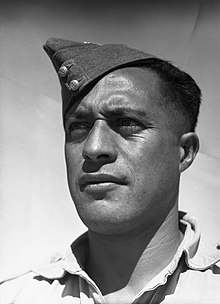Haane Manahi | |
|---|---|
 Haane Manahi in Maadi, Egypt, June 1943 | |
| Birth name | Haane Te Rauawa Manahi |
| Born | 28 September 1913 Ohinemutu, New Zealand |
| Died | 29 March 1986 (aged 72) Tauranga, New Zealand |
| Allegiance | New Zealand |
| Service | New Zealand Military Forces |
| Years of service | 1939–1946 |
| Rank | Lance Sergeant |
| Unit | Māori Battalion |
| Battles / wars | |
| Awards | Distinguished Conduct Medal |
Haane Te Rauawa Manahi, DCM (28 September 1913 – 29 March 1986) was a New Zealand Māori soldier during the Second World War whose gallantry during the Tunisian campaign resulted in a recommendation that he be awarded the Victoria Cross (VC). The subsequent award of the Distinguished Conduct Medal (DCM) disappointed his fellow soldiers who, after his death, advocated greater recognition of his valour. This eventually resulted in a special award in 2007 of an altar cloth for use in a local church, ceremonial sword and a personal letter from Queen Elizabeth II in recognition of his gallantry.
Born in Ohinemutu, New Zealand, Manahi worked as a labourer when, in November 1939, he volunteered to join the Māori Battalion, newly raised for service in the Second World War. In 1941, he participated in the Battle of Greece and fought in the Battle of Crete during which he was wounded. After recovering from his wounds, he returned to his unit and fought through the Western Desert and Tunisian campaigns, during which he was recommended for a VC for his actions at Takrouna over the period 19–21 April 1943. Despite the support of four generals, his VC nomination was downgraded to an award of a DCM, possibly by the British Chief of the General Staff, General Alan Brooke.
In June 1943, he returned to New Zealand on a three-month furlough but when this was completed, was not required to rejoin his battalion. Māori soldiers on furlough were made exempt from active duty. After his discharge from the New Zealand Military Forces in 1946, he was employed as a traffic inspector. After his death in a car crash in 1986, a committee was established to urge the New Zealand Government to make representations to Buckingham Palace for a posthumous award of the VC to Manahi. These efforts were ultimately unsuccessful due to the period of time that had elapsed since the end of the Second World War.